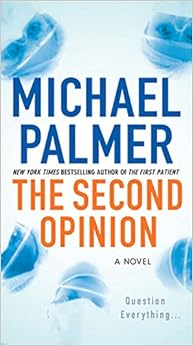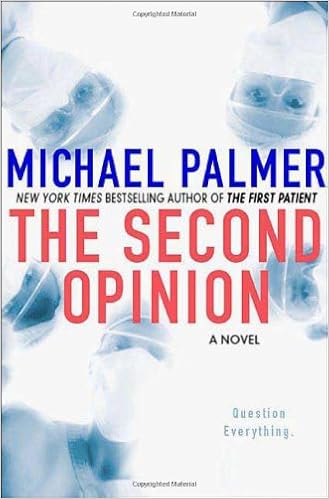
The Second Opinion: A Novel
Description
“A heart-pounding medical thriller…satisfying, expertly paced [with] enough suspense to keep readers happily turning the pages.” ― Boston Globe “The novel is not merely a thriller but also an exploration of its central character's unique gifts and her determination to communicate with her comatose father despite overwhelming odds. Another winner from a consistently fine writer.” ― Booklist “A splendid novel.” ― Globe and Mail (Canada) From the New York Times bestselling author Michael Palmer comes a high-powered thriller that changes the rules of life and death, money and murder―all in the blink of an eye… Struck down by a hit-and-run driver, one of the world's most respected doctors lies comatose in the ICU unit of Boston's Beaumont Clinic. No one thinks he will survive. Two of his children believe treatment should be stopped. But his daughter Thea refuses to give up hope―and begins to suspect a cover-up. As a brilliant physician who left the hospital to work with the poor, Thea knows all too well the hidden agendas and personal conflicts that lurk beneath the surface of an elite medical center. When a late-night hospital intruder is identified as a professional killer, Thea is convinced her father's accident was no accident―and someone plans to finish the job… "Suspenseful…intriguing… The Second Opinion is another winner from a consistently fine writer."― Booklist Who would want to kill a man who saves lives―and why? The answers, Thea fears, are locked deep inside the mind of the only living witness―her father―a man who cannot move or speak. Until the flutter of a single eyelid provides him the means to communicate…and offers Thea a terrifying glimpse into an unfathomable conspiracy. Michael Palmer (1942-2013) wrote internationally bestselling novels of medical suspense, including The First Patient , The Second Opinion , The Last Surgeon , A Heartbeat Away , Oath of Office and Political Suicide . His book Extreme Measures was adapted into a movie starring Hugh Grant and Gene Hackman. His books have been translated into thirty-five languages. Palmer earned his bachelor's degree at Wesleyan University, and he attended medical school at Case Western Reserve University. He trained in internal medicine at Boston City and Massachusetts General Hospitals. He spent twenty years as a full-time practitioner of internal and emergency medicine. In addition to his writing, Palmer was an associate director of the Massachusetts Medical Society Physician Health Services, devoted to helping physicians troubled by mental illness, physical illness, behavioral issues, and chemical dependency. He lived in eastern Massachusetts. Excerpt. © Reprinted by permission. All rights reserved. ONE Multiple contusions and abrasions... Fractured pelvis... Nondisplaced fracture, proximal hu..ondary to posterior displaced fractures of right seventh, eighth, and ninth ribs... With the grim litany ticking through her thoughts, Thea Sperelakis approached Cubicle 4 in the medical ICU of the Beaumont Clinic. Transverse linear skull fracture... Extensive mid–brain stem hemorrhage... Level I coma... Thea hesitated, envisioning what her father would .cialist herself, her projection would not be far from on .mated that the vehicle that struck their father at five thirty in the early morning eight days ago, then drove away, had to have been traveling seventy, at least. It was a miracle he had survived the impact, which threw him more than twenty-five feet. But then, for as long as Thea could remember, Petros Sperelakis was, to his .ten to the point of majesty. The Lion. The absence of skid marks suggested that the driver never saw his victim. Make that his or her victim, Thea edited, intent on enforcing that sort of accuracy, even in .nesses. Alcohol, she guessed. According to an article by Eileen Posnick in a seven-year-old issue of the Ameri.can Journal of Drug and Alcohol Abuse, alcohol was .dents where the drivers were eventually apprehended. .cluded his twin, Selene, plus a trio of Beaumont Clinic dignitaries, and took Thea’s arm. He was swarthy and broad-shouldered, with their father’s strong nose and piercing dark eyes, but with features that were somewhat softer. At forty, he was already an associate professor of cardiac surgery at Harvard—a wunderkind, with several .gant, and totally self-assured, was no less accomplished as a hand surgeon. "You okay, Thea?" Niko asked softly. As she had been taught to do, Thea searched her feelings before responding. Her father, bigger than life itself, was in a deep coma from which there was a 0.01 percent chance he would recover even minimal function—at least according to the retrospective study .kinson et al. in the American Archives of Neurology, .ing the ribs and other fractures. Poor Dad. "I’m okay," she replied. "Want to go in alone?" Why would I want to do that? .ing her head. Would their father be any less comatose if she saw him by herself? She shrugged that it made no difference, but sensed she could have come up with a more acceptable response. "Suit yourself," Niko said in a tone that was quite familiar to her. Thea knew her brother cared about her—Selene, too. She also knew that the twins had always thought she was odd, though certainly not as odd as their oldest sibling, Dimitri. But their attitude, as emphasized over and over by Thea’s longtime therapist and mentor, Dr. Paige Carpenter, was their problem. One in ten thousand... Poor Dad. Thea ran her fingers through her short chestnut hair, .way. As anticipated, there were no surprises. Legendary Petros Sperelakis, medical director of the Sperelakis Institute for Diagnostic Medicine, lay motionless—the central figure in a tableau of medical machines. Across the room, his private duty nurse (Haitian, Thea guessed) rose and introduced herself as Vernice. "I have heard a great deal about you, Dr. Thea," she said. "I hope your flight was an easy one." "I just read," Thea said, taking the husky woman’s smooth, ample hand. I just read. .statements. During the twenty-hour series of flights and layovers from the Democratic Republic of the Congo to Boston, she had read Don Quixote, the second edition of Deadman’s A Manual of Acupuncture .ond time), and Darwin’s Voyage of the Beagle—more than sixteen hundred pages in all. She would have made the trip home sooner, but she was on a mission moving from refugee camp to camp in the bush with a team of nutritionists, and simply couldn’t be reached. "There’s been no change," Vernice said. "I’d be most surprised if there were. He has taken a severe beating—especially to his head." .ing the monitors and intravenous infusions. Petros lay quite peacefully, connected via a tracheotomy tube to a state-of-the-art ventilator. The various Medecins Sans Frontières (Doctors Without Borders) hospitals to which Thea had been assigned over the past five years had been reasonably well equipped, but nothing like this place. .stitution, was a sprawling campus, the size of a small university, consisting of what had once been Boston Metropolitan Hospital, now augmented by two dozen more buildings, varying widely in architectural style. The buildings were linked by tree-lined sidewalks above,..ing in places to stairways that went down for two or three damp stories, and dating back to Metro’s earliest days in the mid-nineteenth century. Oxygen saturation... arterial blood pressure... cerebrospinal fluid pressure... central venous pressure... urine output... chest tube .diac rhythm and ECG pattern... Thea took in the complex data and processed them .thing was nice and steady. At the moment, the fierce battle for the life of Petros Sperelakis was being fought at a cellular and even subcellular level. And his youn.sion to avoid academic medicine and "give her services away," .scopic conflict clearly in her mind’s eye. At best it would probably be weeks before the man regained any consciousness. Along the way, his system would have to negotiate a minefield of infections, blood clots, kidney stones, embolisms, cerebral swelling, chemical imbalance, intestinal obstructions, and cardiac events. But in this setting, with this equipment, he would at least have a fighting chance. Still, from what Thea knew of her father, if it were his choice, it was doubtful he would try very hard to steer clear of the mines. She took the man’s hand and held it for a time. It had been only eight days since the accident, but his muscle mass was already beginning to waste away. In addition to the trach, he had a gastric feeding tube in place, two IVs, a urinary catheter, which was draining briskly into a collection bag, and a BOLT pressure manometer that passed through his skull and into the spinal fluid– containing ventricle of his brain. His eyelids were paper-taped down to protect his corneas from drying out, and splints on his wrists and ankles were strapped in place to prevent joint contractures, against the remote possibility of a return of function. Petros Sperelakis—an icon brought down by a driver who was either in an alcoholic blackout or was aware enough to try and get away before anyone showed up. Never had Thea’s father looked even remotely vulnerable to her. Now, he looked frail and pathetically infantile. Thea sensed that she was expected to stay at the bedside a bit longer, and she planned to be there as much as possible in the days to come. But she had slept little if any on the planes, and the exhaustion of the flights was beginning to take hold. Fifteen minutes, she decided. Fifteen more minutes would be enough to stay at the bedside whether the others thought so or not. Niko had invited her to stay at his house, but three kids under ten, much as she loved them, provided more commotion than she could handle. Selene and her partner, a banker or businesswoman of some kind, lived in a designer high-rise condo by the harbor. The obvious choice was the spacious Wellesley home in which she and the others had grown up, and where Petros still lived with the ghost of their mother and with Dimitri who, many years before, had moved into the carriage house along with his computers, his monitors, his shortwave radio, his telescope, his machinery, his library of ma Read more
Features & Highlights
- Struck down by a hit-and-run driver, one of the world's most respected doctors lies comatose in the ICU unit of Boston's Beaumont Clinic. No one thinks he will survive. Two of his children believe treatment should be stopped. But his daughter Thea refuses to give up hope―and begins to suspect a cover-up. As a brilliant physician who left the hospital to work with the poor, Thea knows all too well the hidden agendas and personal conflicts that lurk beneath the surface of an elite medical center. When a late-night hospital intruder is identified as a professional killer, Thea is convinced her father's accident was no accident―and someone plans to finish the job…
- Who would want to kill a man who saves lives―and why?
- The answers, Thea fears, are locked deep inside the mind of the only living witness―her father―a man who cannot move or speak. Until the flutter of a single eyelid provides him the means to communicate…and offers Thea a terrifying glimpse into an unfathomable conspiracy.




